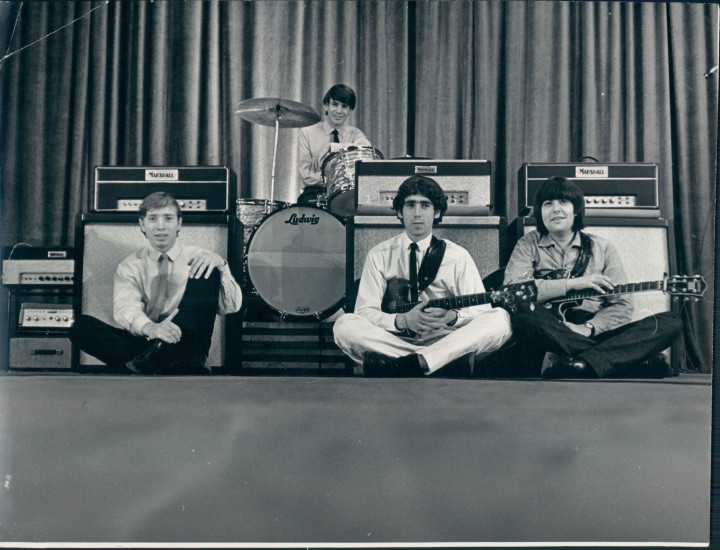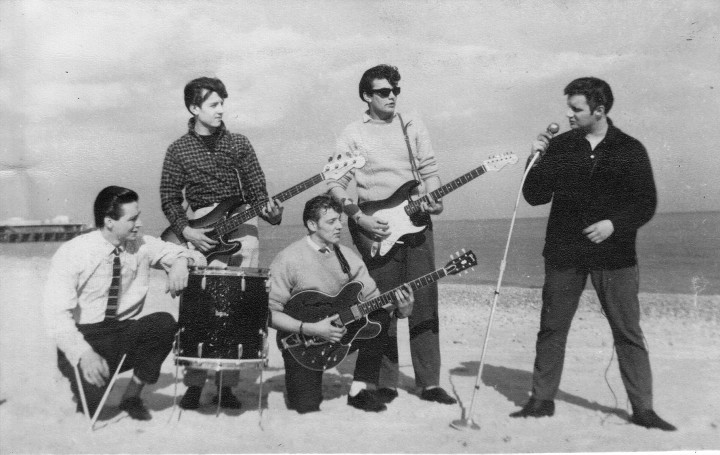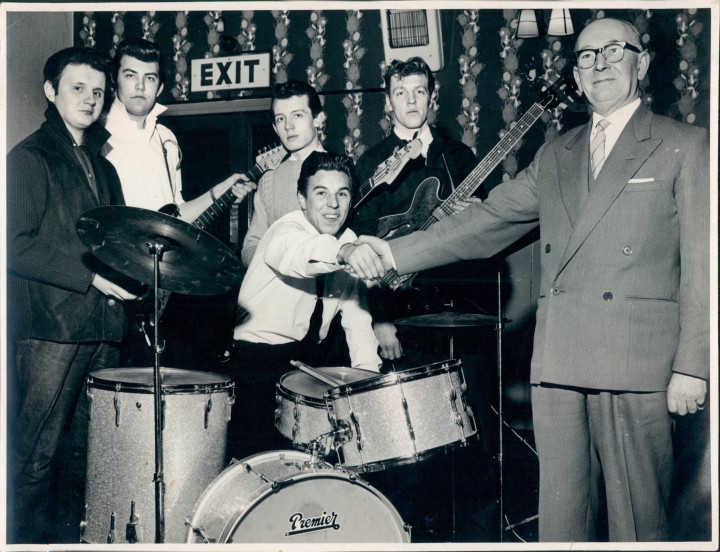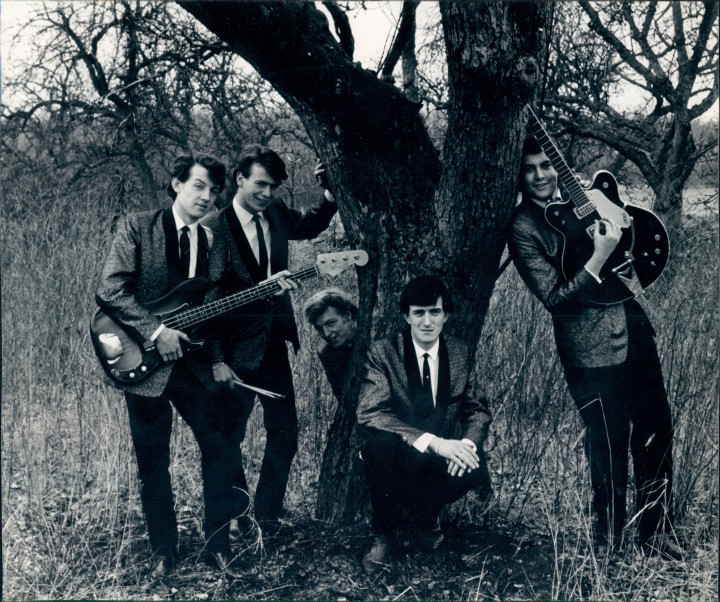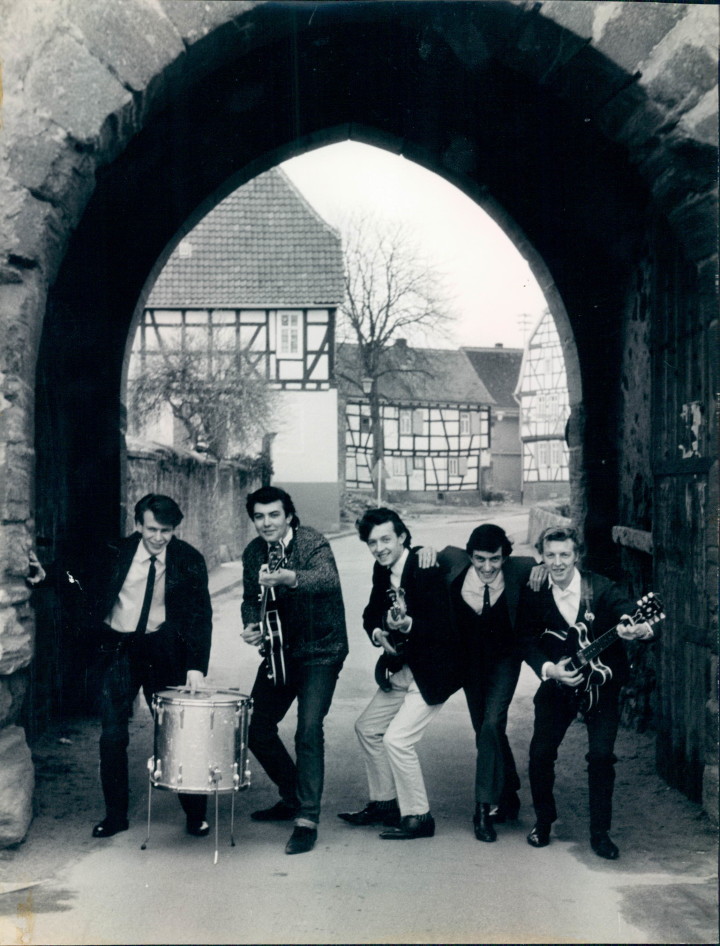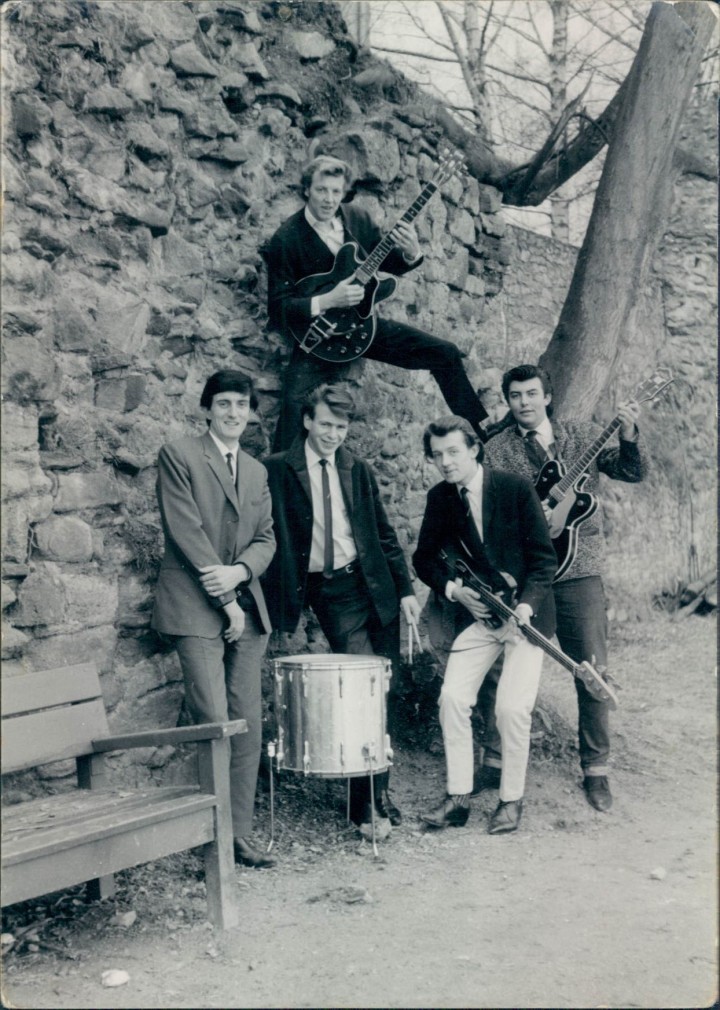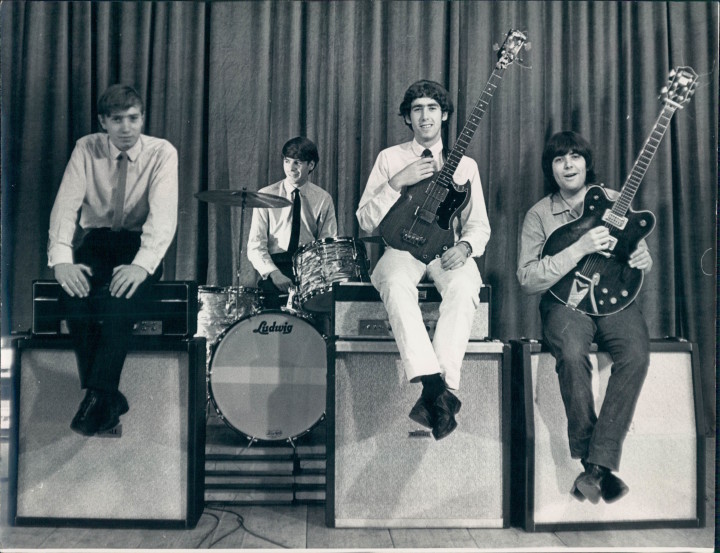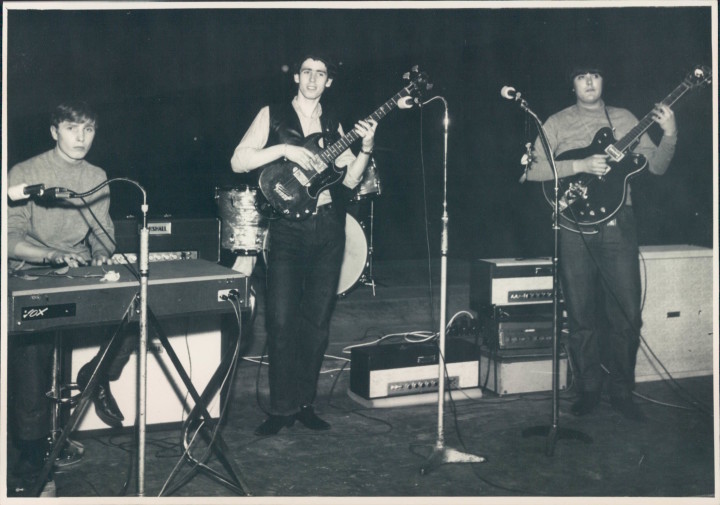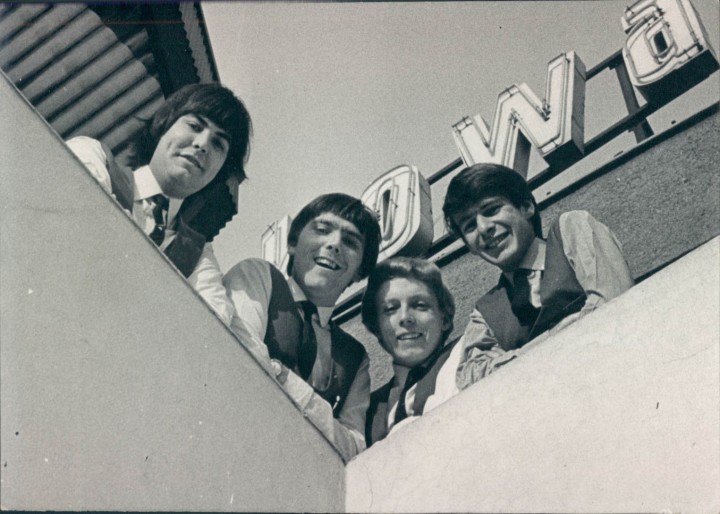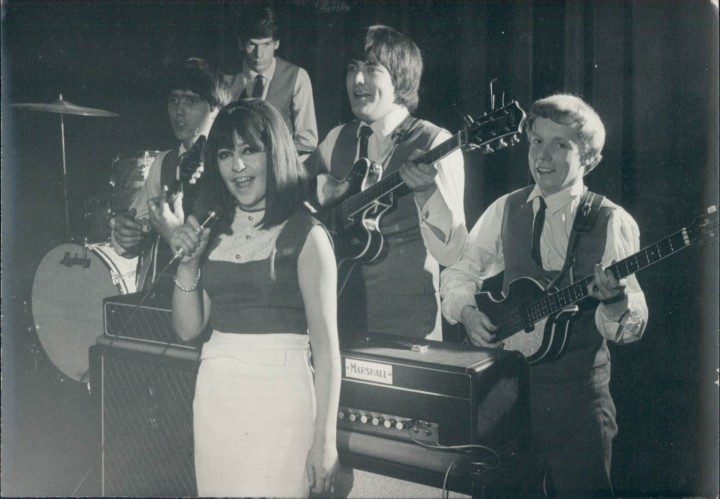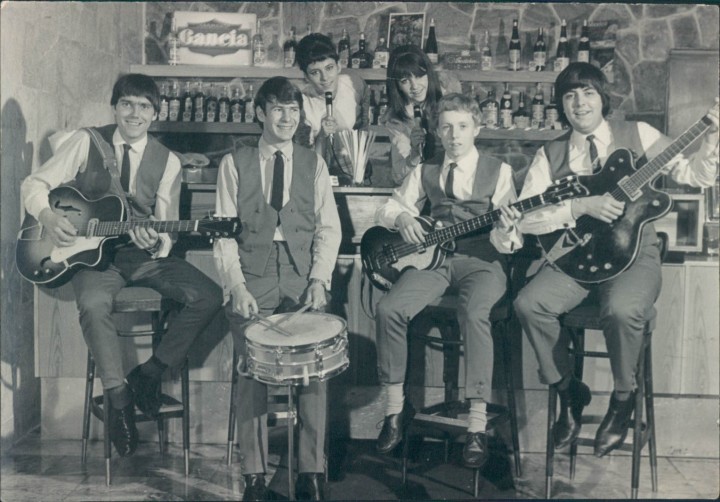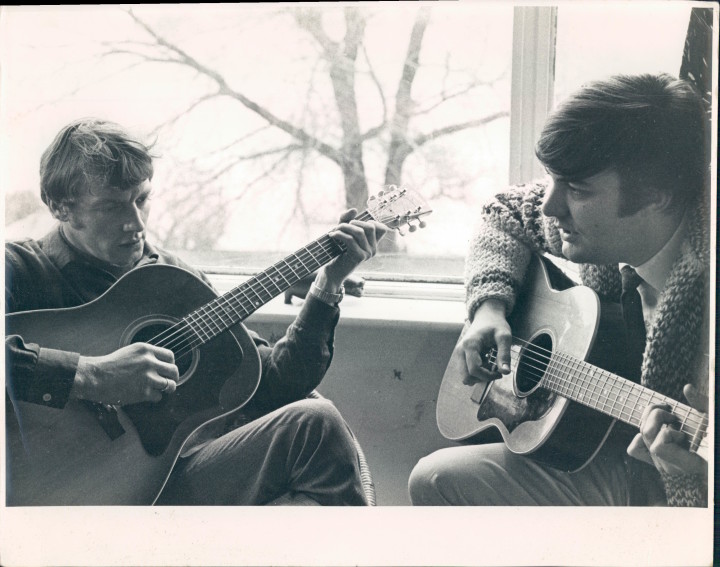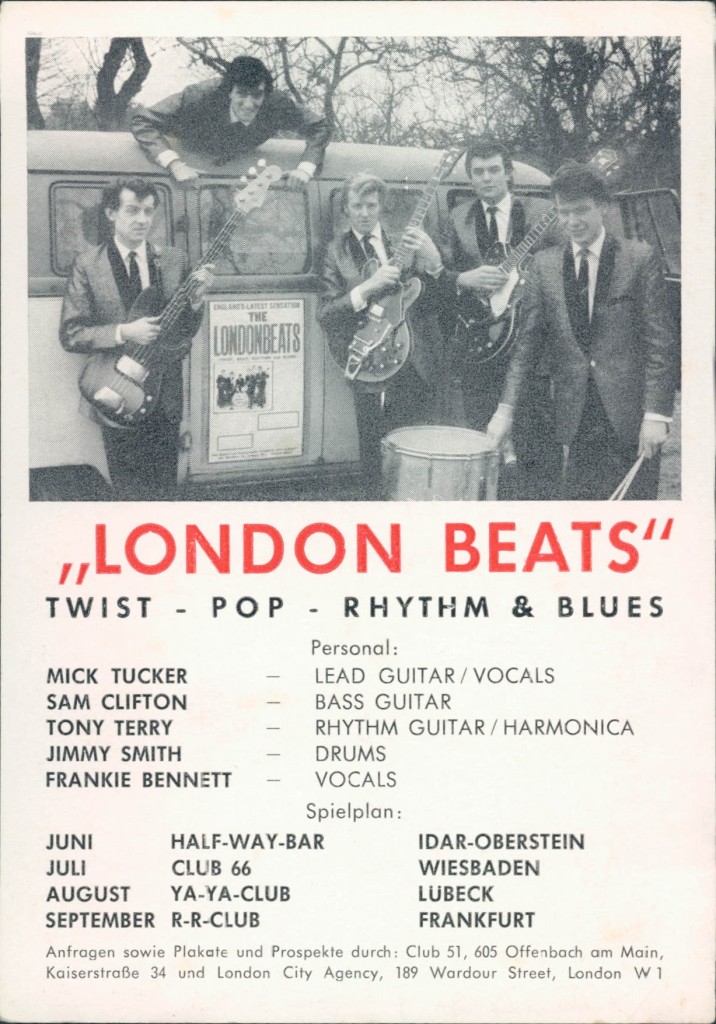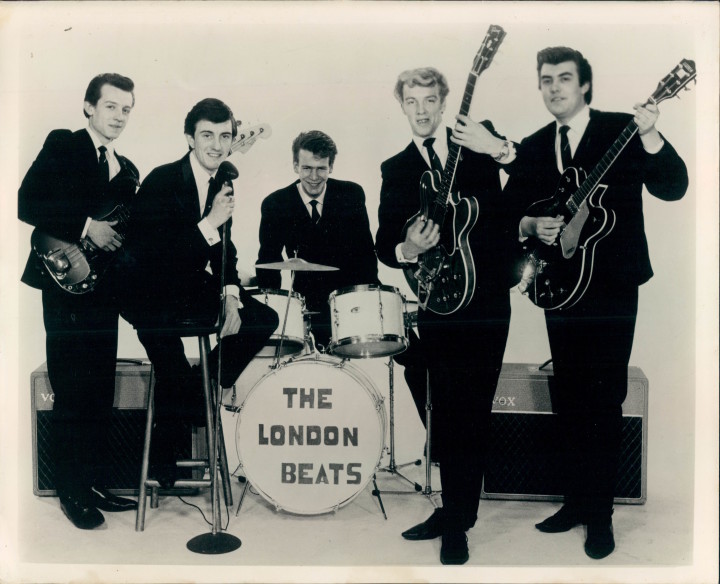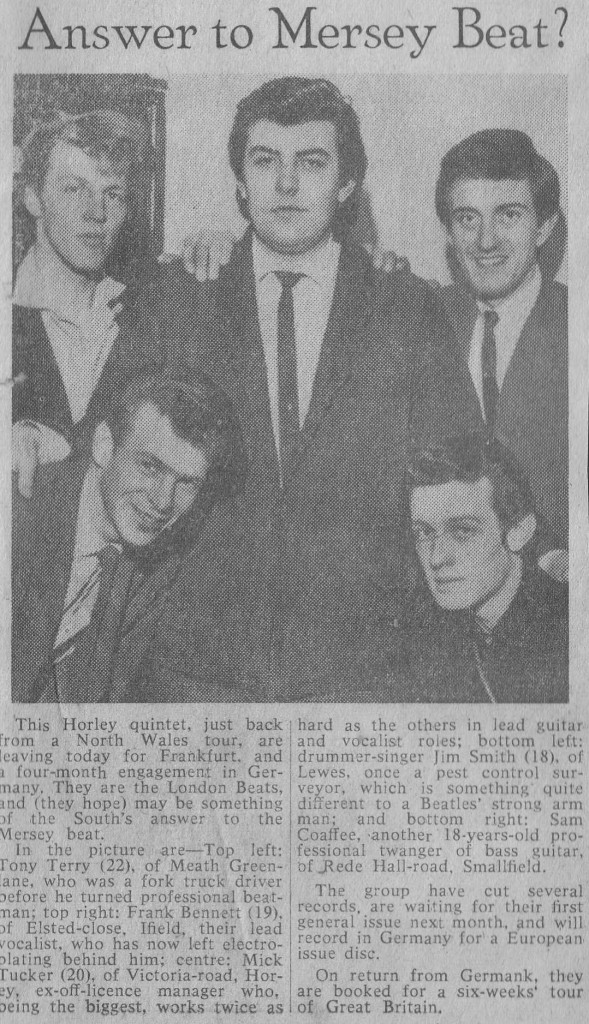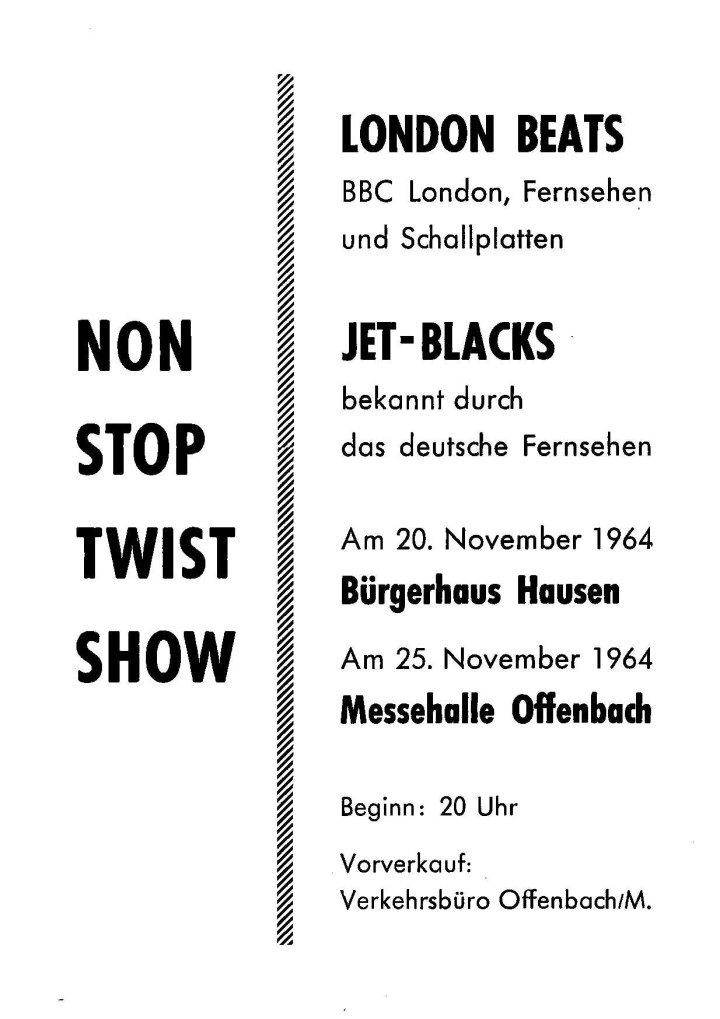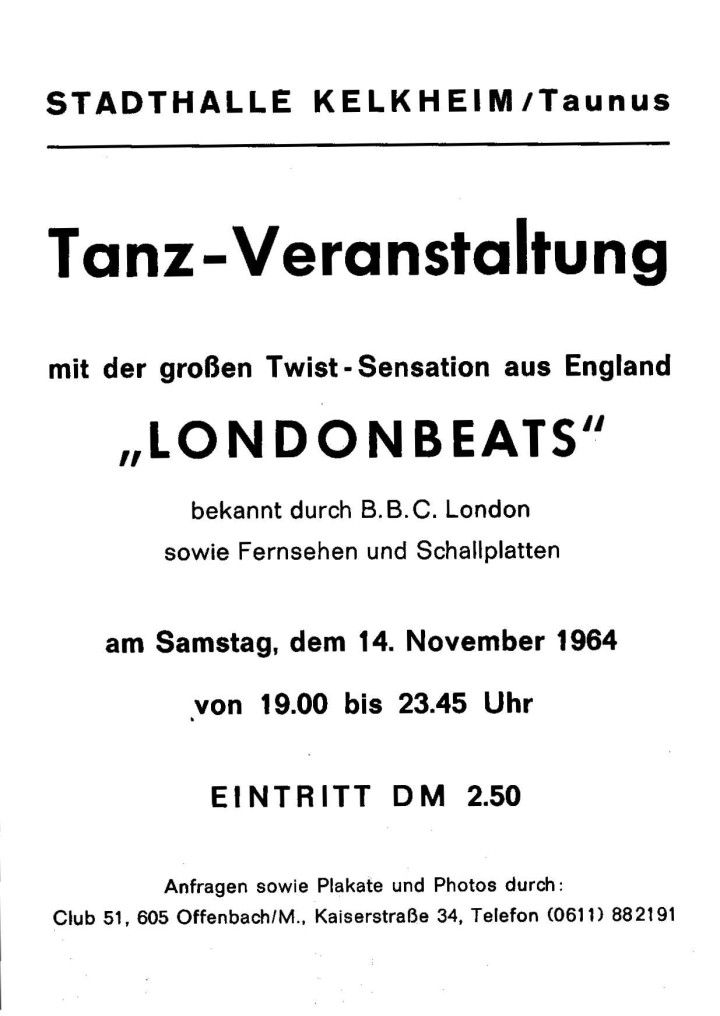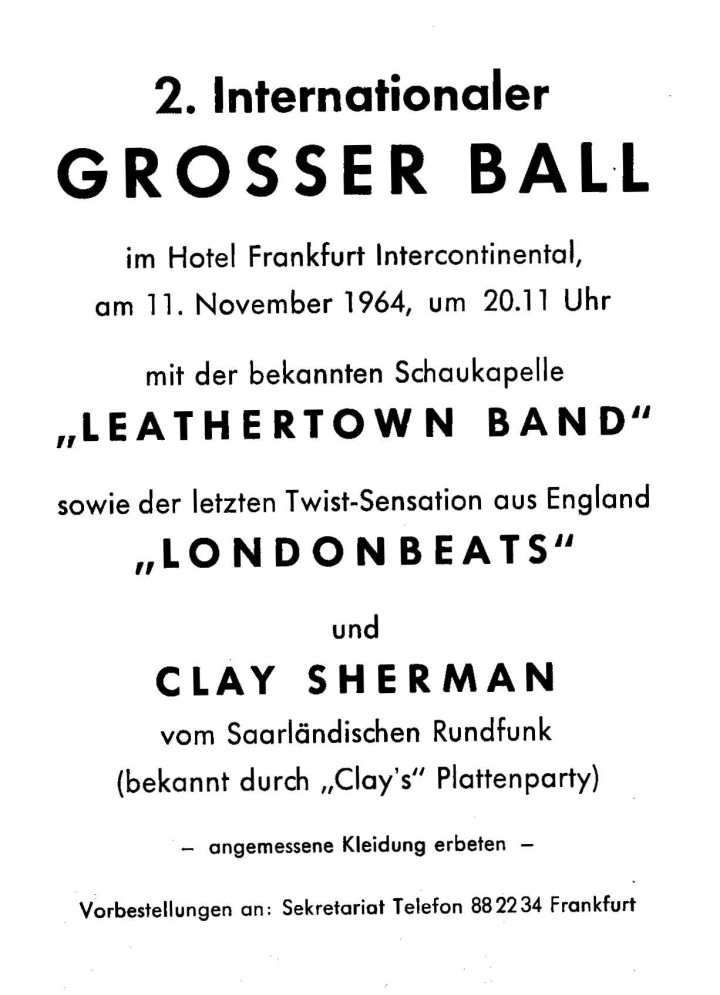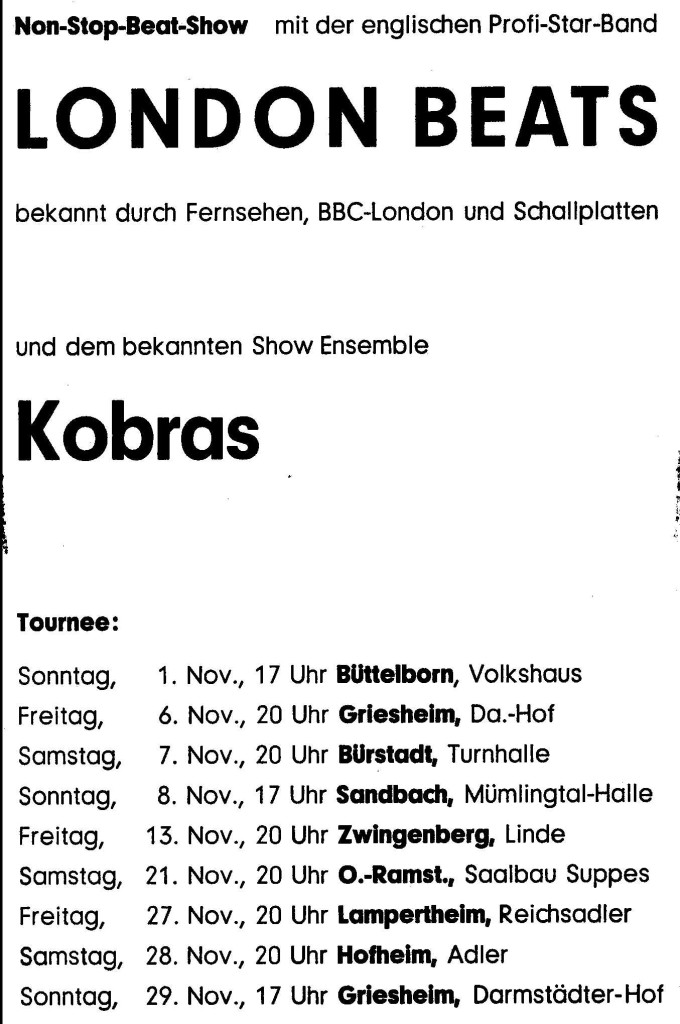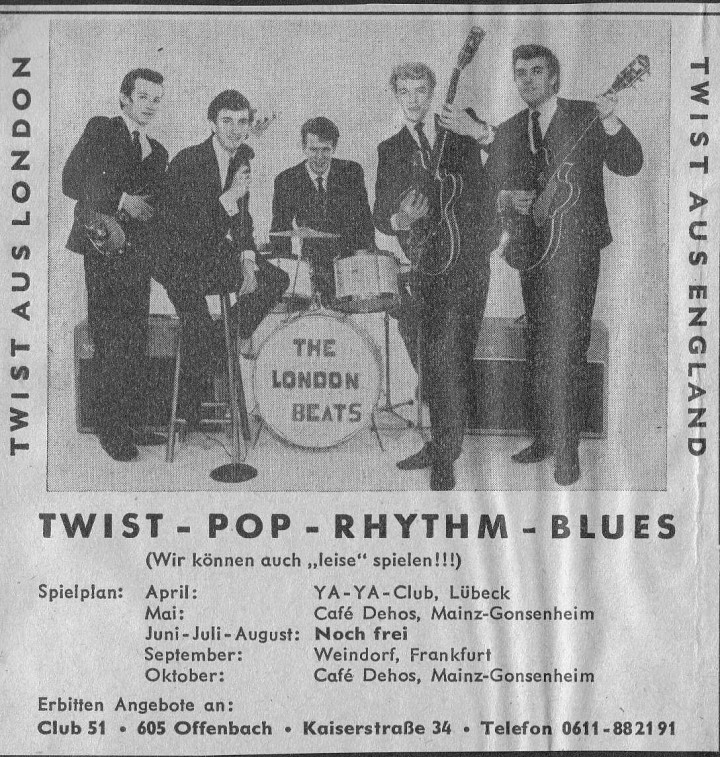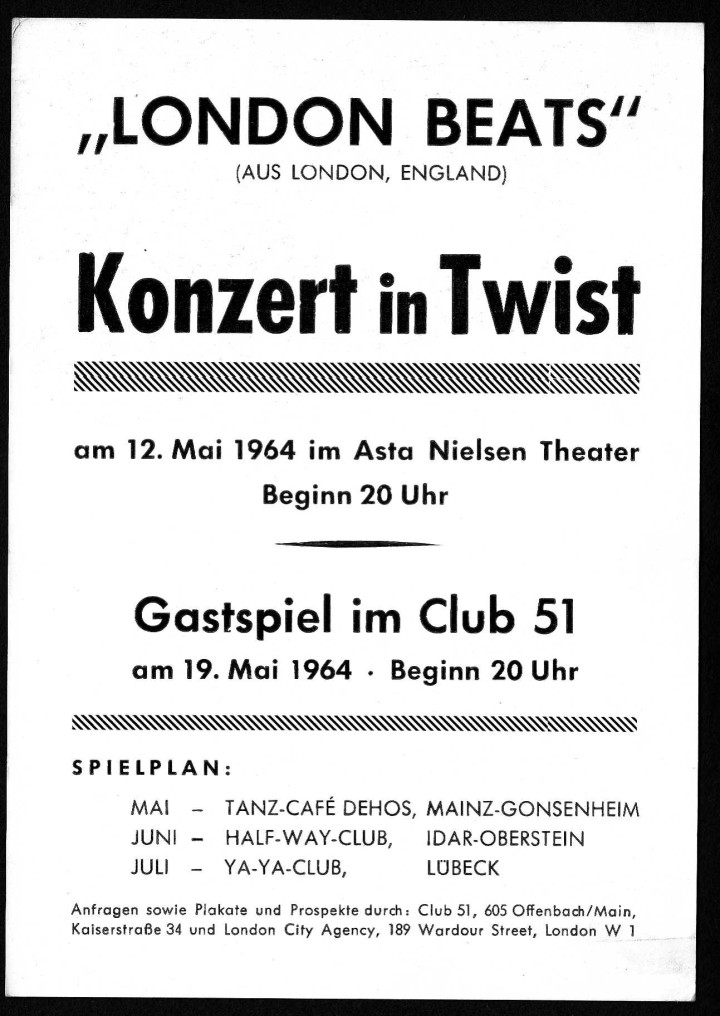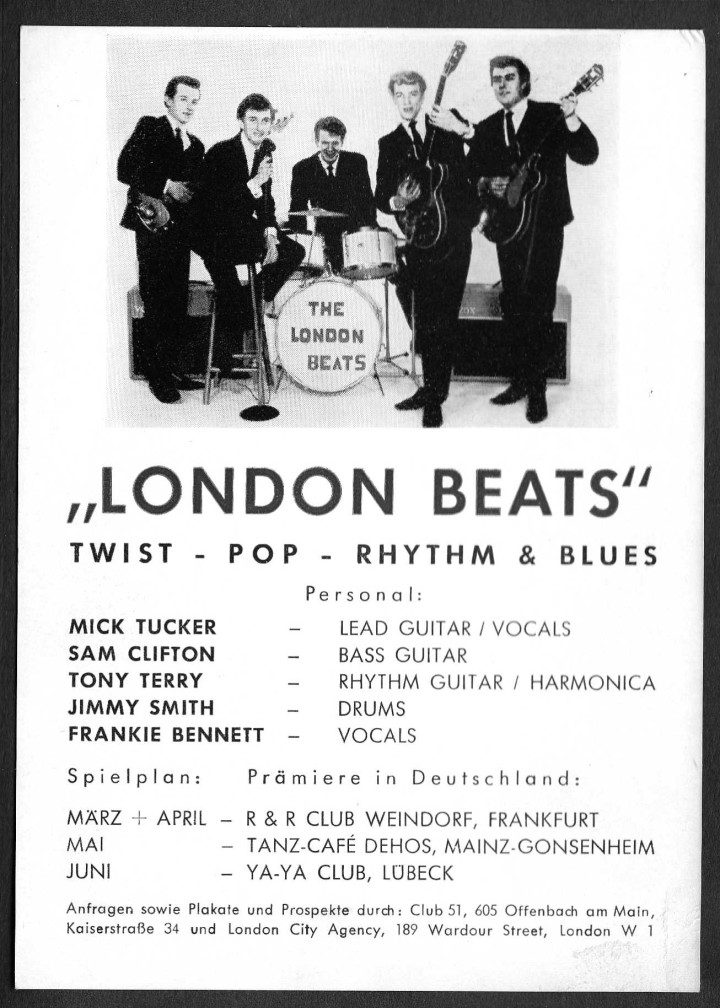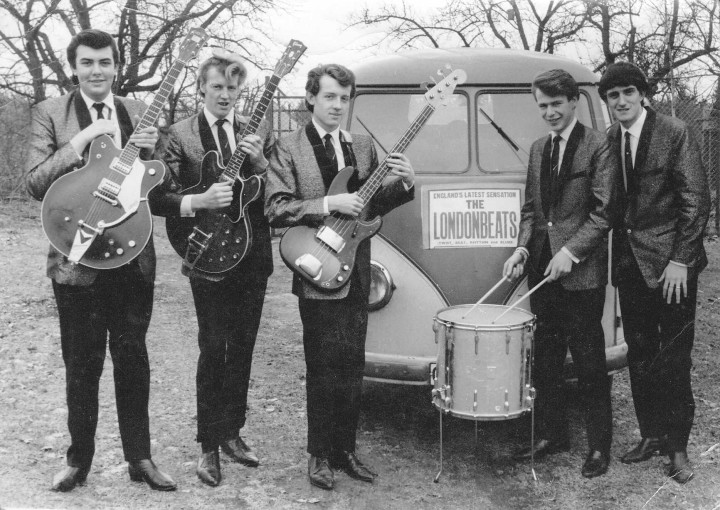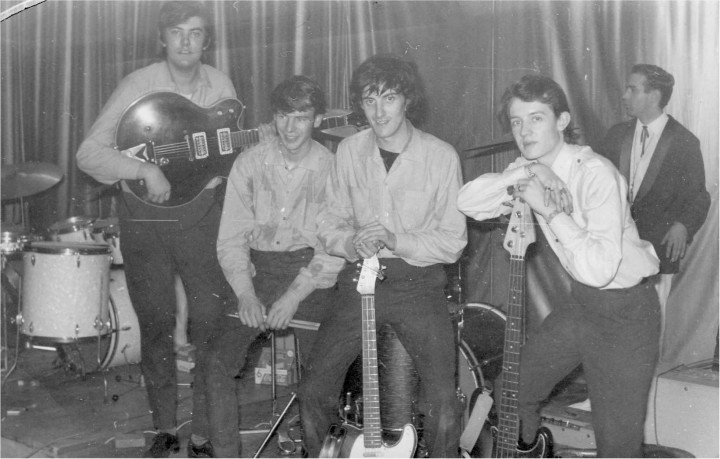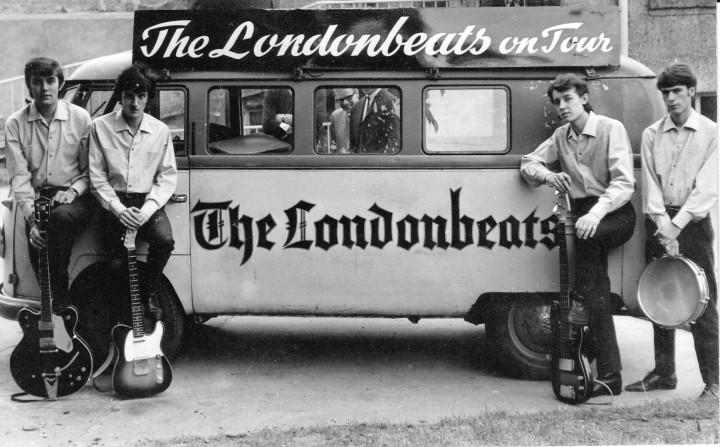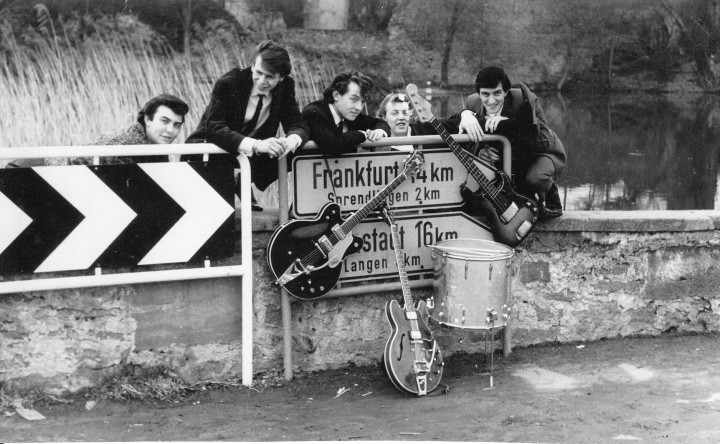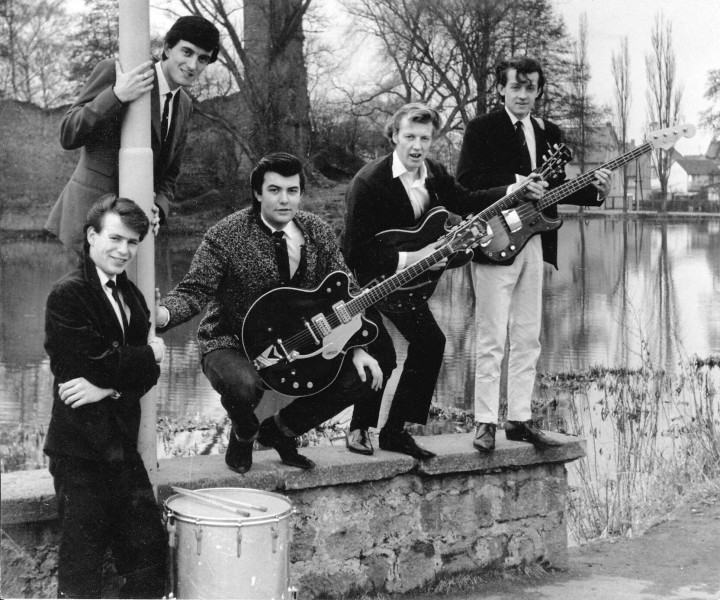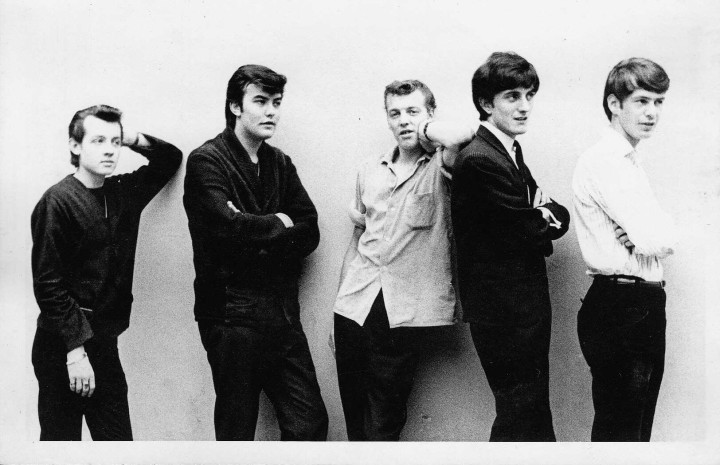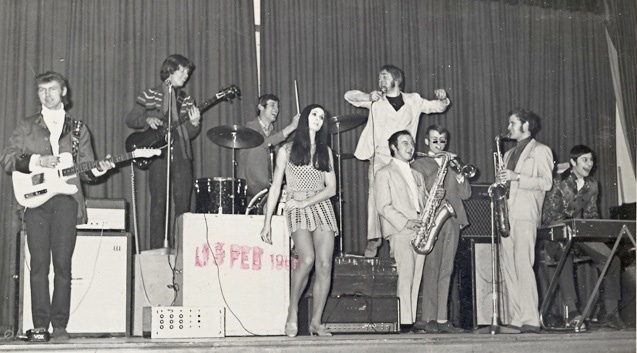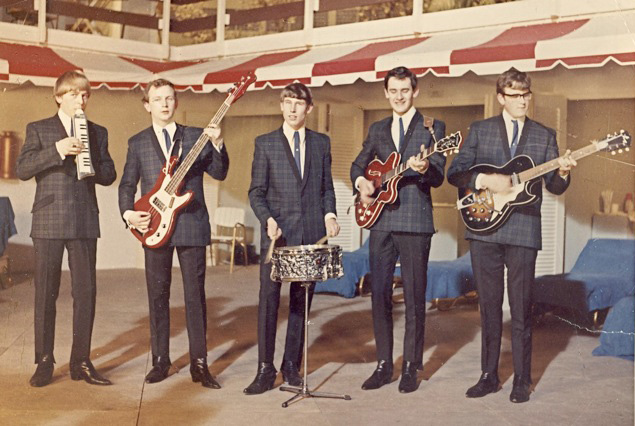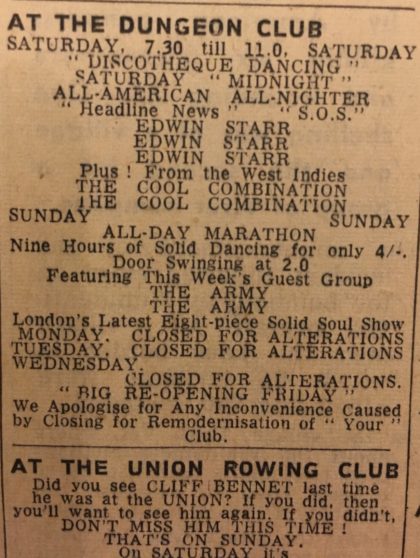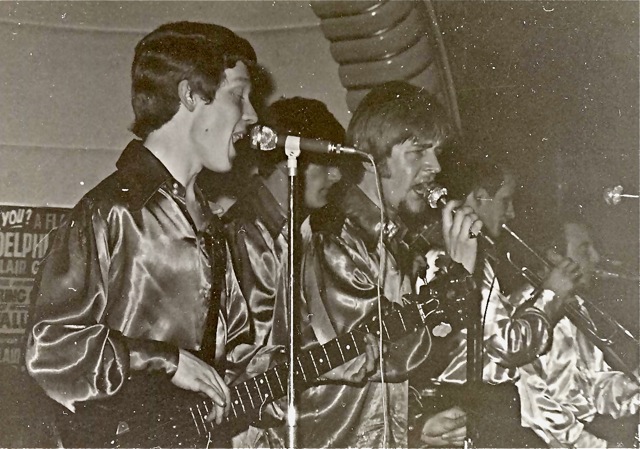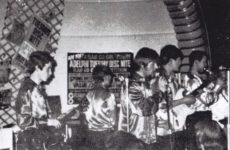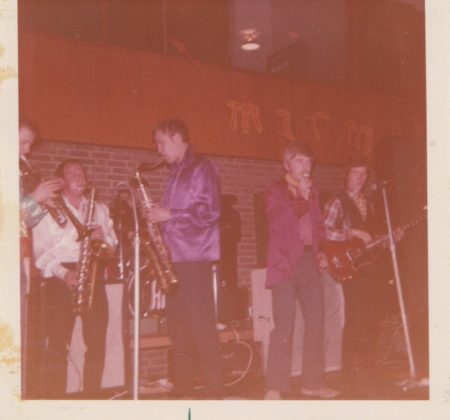
Chris Wright – lead vocals
Jim Searle – lead guitar
Alfred Fripp – rhythm guitar
Jan Frewer – bass, vocals
Phil Kenton – drums
West London band Wainwright’s Gentlemen are most notable for containing several musicians who went on to fame and fortune in the late 1960s and early 1970s – Ian Gillan (Deep Purple) and Brian Connolly and Mick Tucker (The Sweet).
Formed as Unit 4 in early 1963, the band’s original formation comprised lead guitarist Jim Searle, rhythm guitarist Alfred Fripp (who had previously played with Hayes, Middlesex high school band, Paul & The Alpines) and bass player/singer Jan Frewer. Soon after, the trio were joined by lead singer Chris Wright and drummer Phil Kenton.

Taking on Jan’s father, John, as the group’s manager, the musicians began gigging at youth clubs and social clubs in the Hayes, Harrow and Wembley areas.
During late 1963, however, the band changed name to Wainwright’s Gentlemen after the musicians discovered that there was another Unit 4 on the west London scene (future Brinsley Schwartz Ian Gomm’s group).
In early 1964, Wainwright’s Gentlemen became resident band at Hayes Beat Club in Hayes, Middlesex and also landed a residency at two coffee bars in London’s West End – Le Chat Qui Peche in Regent Street and the Cave St Germain in Poland Street.
Having entered the Mecca Dancing and Walls Ice Cream nationwide Beat Group contest, Wainwright’s Gentlemen appeared at Hammersmith Palais on 9 January 1964 in their area competition, beating several groups, including The Detours, who later became The Who.
Wainwright’s Gentlemen returned to the Hammersmith Palais on 6 February for the ‘Hall Final’, which the band won.

Unfortunately, when the national finals were held at the Lyceum on the Strand on 4 May, the group finished fifth out of 13 bands.
Later that year, Wainwright’s Gentlemen secured a recording test at Jackson Sound Studios in Rickmansworth but the session was not successful.
In mid-October, the band added Annette Culley as a second singer. She may have been the same Annette who sang with The Keymen.
Wright, who worked at Dawe Instruments in Acton, Middlesex, invited tenor sax player Dave Brogden from The Midnites to join the group in early November 1964 but the very night he auditioned and joined Wainwright’s Gentlemen, Wright had a falling out with Jan Frewer’s father and departed.
Selected gigs:
9 January 1964 – Mecca Dancing and Walls Ice Cream’s nationwide Beat Group Contest, Hammersmith Palais, Hammersmith, west London
10 January 1964 – Bedsitter Club, Holland Park, west London
11 January 1964 – Le Chat qui Peche, Regent Street, central London
6 February 1964 – Hall Final of Mecca Dancing nationwide Beat Group Contest, Hammersmith Palais, Hammersmith, west London
21 February 1964 – Bedsitter Club, Holland Park, west London
28 February 1964 – Bedsitter Club, Holland Park, west London
1 March 1964 – Beat contest at Watford Town Hall, Watford, Herts with others The group came third
7 March 1964 – The Scene, Florida Room, Brighton, West Sussex
9 March 1964 – Bedsitter Club, Holland Park, west London
30 March 1964 – Hi-Fi Hop, Walton Playhouse, Walton-on-Thames, Surrey
30 April 1964 – Bedsitter Club, Holland Park, west London
2 May 1964 – Long’s Ballroom, Bishop Stortford, Herts with The Marauders
4 May 1964 – Mecca Dancing nationwide Beat Group Contest finals, Lyceum Ballroom, Strand, central London with others

23 May 1964 – Hi-Fi Hop, Walton Playhouse, Walton-on-Thames, Surrey

6 June 1964 – Assembly Hall, Walthamstow, north London with Johnny Lonesome & The Travellers adn Keith Young & The Skyways

9 June 1964 – Hi-Fi Hop, Walton Playhouse, Walton-on-Thames, Surrey
12 June 1964 – Long’s Ballroom, Bishop’s Stortford, Hertfordshire with Manfred Mann

27 June 1964 – Hi-Fi Hop, Walton Playhouse, Walton-on-Thames, Surrey
6 July 1964 – Attic Club, 1a High Street, Hounslow, Middlesex with Rory Blackwell & His Monsters

25 July 1964 – Assembly Hall, Walthamstow, north London with The Four Zodiacs and The Nu-Trons

31 July 1964 – Whitehall, East Grinstead, West Sussex with The Shades
8 August 1964 – Bedsitter Club, Holland Park, west London
13 September 1964 – Attic, Hounslow, Middlesex

25 September 1964 – Attic Club, 1a High Street, Hounslow, Middlesex with Ken Gordon & The Downsiders

29 September 1964 – Kodak Hall, Wealdstone, Middlesex with The Dolphins and The Beachcombers

4 October 1964 – Kihoty Club, Guildford, Surrey with The Aces and The Shieks

24 October 1964 – Witham Public Hall, Witham, Essex (Billed as Annette with Wainwright’s Gentlemen)
Ian Gillan – lead vocals
Annette Cully – lead vocals
Jim Searle – lead guitar
Alfred Fripp – rhythm guitar
Dave Brogden – tenor saxophone
Jan Frewer – bass, vocals
Phil Kenton – drums
Within days of Dave Brogden joining on tenor saxophone, Wainwright’s Gentlemen brought in Chris Wright’s replacement – Ian Gillan, lead singer with Hayes, Middlesex group, The Javelins.
The new formation remained steady until early March 1965. Brogden’s diary shows that the musicians traveled to Jackson Sound Studios in Rickmansworth on a number of dates in February (3rd, 10th, 15-16th, 19th and 28th) presumably to cut material. However, his original date sheet puts the recording dates for the three tracks that the band cut as 3rd, 8th and 15th March.
Wainwright’s Gentlemen recorded three tracks – “Ain’t That (Just Like Me)”, which has since surfaced on Acid Jazz’s Rare Mod 3 CD compilation; “Que Sera Sera”; and “Slow Down”.

At the start of March, Dave Brogden gave three months’ notice that he was leaving Wainwright’s Gentlemen to join west London group Jean & The Statesides. His first contribution to his new band was at EMI Abbey Road studio on 17 June. He would remain with The Statesides until 26 September when Phil Kenton got in touch to join him in an Irish show band at an Irish dance hall in Balham, south London (see later entry).
Around the same time, Ian Gillan started to get itchy feet and covertly started his own band Ian & The Dragsters who gigged intermittently while he remained with Wainwright’s Gentlemen until late April. Dave Brogden played with Gillan’s band on nights when Wainwright’s Gentlemen weren’t gigging.
Selected gigs:
7 November 1964 – Star & Garter, Windsor, Berkshire
8 November 1964 – La Dolphin Club, Baker Street, central London
12 November 1964 – Wistowe House dance hall, Hayes, Middlesex

14 November 1964 – Dreamland, Margate, Kent with Tony Lindell & The Cruisers
15 November 1964 – Star & Garter, Windsor, Berkshire
16 November 1964 – Seagull Hotel, Southall, Middlesex

21 November 1964 – Assembly Hall, Walthamstow, north London with The Mad Hatters and Brian Ford & The Sapphires
22 November 1964 – Star & Garter, Windsor, Berkshire
25 November 1964 – USAF Ruislip, Ruislip, Middlesex
26 November 1964 – Wistowe House dance hall, Hayes, Middlesex
29 November 1964 – Star & Garter, Windsor, Berkshire
30 November 1964 – Seagull Hotel, Southall, Middlesex

1 December 1964 – Hammersmith Town Hall, Hammersmith, west London with The Grenades, The Impacts and The Fairlanes
3 December 1964 – Locarno Ballroom, Streatham, southwest London
6 December 1964 – Star & Garter, Windsor, Berkshire
7 December 1964 – Seagull Hotel, Southall, Middlesex
10 December 1964 – Wistowe House dance hall, Hayes, Middlesex
12 December 1964 – Hammersmith Town Hall, Hammersmith, west London
13 December 1964 – Start & Garter, Windsor, Berkshire
17 December 1964 – Locarno Ballroom, Streatham, southwest London
18 December 1964 – Willesden Grammar School Youth Club, Willesden, northwest London
19 December 1964 – Hotel in Holborn, central London
20 December 1964 – Star & Garter, Windsor, Berkshire
22 December 1964 – Overseas Visitors Club, Fulham, west London
23 December 1964 – Ventures Youth Club, Greenford, Middlesex

24 December 1964 – Plaza Ballroom, Guildford, Surrey with The Downsiders
26-27 December 1964 – Star & Garter, Windsor, Berkshire
28 December 1964 – Seagull Hotel, Southall, Middlesex
31 December 1964 – Whitehall, East Grinstead, West Sussex
1 January 1965 – Ventures Youth Club, Greenford, Middlesex
2 January 1965 – Watford Town Hall, Watford, Herts
3 January 1965 – Star & Garter, Windsor, Berkshire
7 January 1965 – Wistowe House dance hall, Hayes, Middlesex
8 January 1965 – Ashford Golf Club, Ashford, Middlesex
9 January 1965 – Unknown venue in West Wickham, Kent
10 January 1965 – Star & Garter, Windsor, Berkshire
11 January 1965 – Seagull Hotel, Southall, Middlesex
14 January 1965 – Wistowe House dance hall, Hayes, Middlesex
15 January 1965 – London School of Economics, central London
16 January 1965 – Dreamland, Margate, Kent with Twinkle and The Gonks
17 January 1965 – Locarno Ballroom, Leicester
20 January 1965 – Ballroom in Dartford, Dartford, Kent
21 January 1965 – Clay Pigeon, Eastcote, Middlesex
23-24 January 1965 – Star & Garter, Windsor, Berkshire
27 January 1965 – Hall in Carpenter’s Park (this could be Carpenders Park, Watford)
28 January 1965 – Wistowe House dance hall, Hayes, Middlesex
29 January 1965 – Hoover Social Club, Alperton, Middlesex

30 January 1965 – Hi-Fi Hop, Walton Playhouse, Walton-on-Thames, Surrey
31 January 1965 – Star & Garter, Windsor, Berkshire
1 February 1965 – Seagull Hotel, Southall, Middlesex
5 February 1965 – Ealing Club, Ealing, Middlesex with Unit 5
6 February 1965 – Annunciation Club, Wembley, Middlesex
7 February 1965 – Star & Garter, Windsor, Berkshire
11 February 1965 – Wistowe House dance hall, Hayes, Middlesex
13 February 1965 – Tottenham Town Hall, Tottenham, north London
14 February 1965 – Kodak Social Club, Hemel Hempstead, Herts
17 February 1965 – London School of Economics, the Strand, central London
18 February 1965 – BOAC Social Club, Northolt, Middlesex
20 February 1965 – Railway Hotel, Greenford, Middlesex
21 February 1965 – Star & Garter, Windsor, Berkshire
22 February 1965 – Seagull Hotel, Southall, Middlesex
23 February 1965 – Kodak Social Club, Harrow, Middlesex
25 February 1965 – Wistowe House dance hall, Hayes, Middlesex
25 February 1965 – Clay Pigeon, Eastcote, Middlesex (advertised in newspaper)
26 February 1965 – Kookey Nook, Windsor, Berkshire
27 February 1965 – Whetstone Hotel, Finchley, north London
28 February 1965 – Star & Garter, Windsor, Berkshire
Ian Gillan – lead vocals
Annette Cully – lead vocals
Jim Searle – lead guitar
Alfred Fripp – rhythm guitar
Dennis ??? – tenor saxophone (or Dave Brogden intermittently)
Jan Frewer – bass, vocals
Phil Kenton – drums
During early March 1965, Wainwright Gentlemen’s employed a tenor sax player called Dennis to cover for Dave Brogden, who was unable to commit to the band fully (he was working covertly and intermittently with Gillan’s band The Dragsters). Dennis, however, only lasted around a month until late March.
Even though he was leaving in mid-June to join Jean & The Statesides, Dave Brogden agreed with Jan Frewer to continue to perform with Wainwright’s Gentlemen from 1 April to 24 September whenever he was able to honour gigs (see gigs with *).
After a gig on 26 April, lead singer Ian Gillan left Wainwright’s Gentlemen to concentrate on his own group, Ian Gillan & The Dragsters. However, soon after performing a gig on 20 May with his band, Gillan joined Episode Six and later found fame with Deep Purple.

Alfred Fripp departed on the same date as Ian Gillan and joined south London band Jaymes Fenda & The Vulcans. Fripp would briefly return to Wainwright’s Gentlemen in January 1967 when Frewer was injured in a car accident and covered bass duties until Frewer recovered.
Selected gigs:
2 March 1965 – Kodak Hall, Wealdstone, Middlesex with The Gaylords and The Beachcombers
4 March 1965 – Clay Pigeon, Eastcote, Middlesex
18 March 1965 – Clay Pigeon, Eastcote, Middlesex
1 April 1965 – Clay Pigeon, Eastcote, northwest London *
2 April 1965 – Leonian Hall, Harrow, northwest London *
3 April 1965 – Blythe Hotel, Sevenoaks, Kent *
4 April 1965 – Windsor, Berkshire (most likely Star & Garter)
5 April 1965 – Seagull Hotel, Southall, west London
8 April 1965 – Wistowe House dance hall, Hayes, west London
9 April 1965 – Café des Artistes, Fulham, southwest London
10 April 1965 – Scala, Dartford, Dartford, Kent *
11 April 1965 – Windsor, Berkshire (most likely Star & Garter)
12 April 1965 – Co-op Hall, Wealdstone, northwest London *
15 April 1965 – Clay Pigeon, Eastcote, northwest London
16 April 1965 – Café des Artistes, Fulham, southwest London
17 April 1965 – Cinema in Watford, Watford, Herts *
18 April 1965 – Kodak Social Club, Hemel Hempstead, Hertfordshire
19 April 1965 – Dreamland Ballroom, Margate, Kent with Tony Rivers & The Castaways
22 April 1965 – Wistowe House dance hall, Hayes, west London
23 April 1965 – Café des Artistes, Fulham, southwest London
25 April 1965 – Southall Community Centre, Southall, west London
26 April 1965 – Seagull Hotel, Southall, Middlesex (Gillan and Fripp’s last gig)
Annette Cully – lead vocals
Jim Searle – lead guitar
Jan Frewer – bass, vocals
Phil Kenton – drums
+
Dave Brogden – tenor sax (intermittently)
The stripped back line-up played just over a week’s worth of gigs with Brogden helping out when he could make the commitment. However, around 10 May, Jan Frewer’s father brought in two new musicians – keyboard player Tyni Manning and new tenor sax player Robert Schole.
Selected gigs:
29 April 1965 – Clay Pigeon, Eastcote, northwest London
30 April 1965 – Café des Artistes, Fulham, southwest London
2 May 1965 – Windsor, Berkshire (most likely Star & Garter)
3 May 1965 – Wimbledon Palais, Wimbledon, southwest London * (this was mentioned in a newspaper cutting, dated 19 May)
6 May 1965 – Wistowe House dance hall, Hayes, west London
7 May 1965 – Café des Artistes, Fulham, southwest London *
8 May 1965 – Venue in Reading, Berkshire (possibly Olympia Ballroom) *
9 May 1965 – Windsor, Berkshire (most likely Star & Garter)

Annette Culley – lead vocals
Jim Searle – lead guitar
Tyni Manning – keyboards
Jan Frewer – bass, vocals
Robert Schole – tenor saxophone
Phil Kenton – drums
The new line-up was short-lived and could have only lasted a month or so (possibly until 4 June) despite being promoted (and photographed) in the Harrow Weekly Post on 19 May.

Selected gigs:
13 May 1965 – Clay Pigeon, Eastcote, northwest London
15 May 1965 – St Mary’s College (most likely in Twickenham, west London)
16 May 1965 – Star & Garter, Windsor, Berkshire
20 May 1965 – Wistowe House dance hall, Hayes, west London
21 May 1965 – Old Lyon Hall, Harrow, northwest London (may have been Café de Artiste in Fulham, southwest London instead but was advertised in Harrow Observer & Gazette)
22 May 1965 – Star & Garter, Windsor, Berkshire
23 May 1965 – gig in Mudeford (Dorset?)
27 May 1965 – Clay Pigeon, Eastcote, northwest London
28 May 1965 – Café des Artistes, Fulham, southwest London
29 May 1965 – Starlite (but was this Greenford, northwest London)
30 May 1965 – Windsor, Berkshire (most likely Star & Garter)
2 June 1965 – Clay Pigeon, Eastcote, northwest London with Tony Rivers & The Castaways (Melody Maker says 3 June)
3 June 1965 – Wistowe House dance hall, Hayes, west London
4 June 1965 – Café des Artistes, Fulham, southwest London
Annette Culley – lead vocals
Jim Searle – lead guitar
Jan Frewer – bass, vocals
Phil Kenton – drums
+
Dave Brogden – tenor saxophone (intermittently)
As agreed with Jan Frewer, Dave Brogden continued to occasionally gig with Wainwright’s Gentlemen (see below gigs with*) when he wasn’t working with The Statesides, who he officially joined on 17 June. This agreement to sit in with Wainwright’s Gentlemen lasted until late September.

Brogden remembers that a few days after 26 September, Wainwright Gentlemen’s drummer Phil Kenton got in touch (possibly because there was a hiatus in Wainwright Gentlemen’s gigs) and said he’d been offered an extremely well paid gig with an Irish show band performing at an Irish dance hall in Balham. The group also needed a sax player and the residency, which guaranteed three nights a week, started on 1 October.
The sax player left The Statesides and Kenton departed Wainwright’s Gentlemen to join the Irish show band but Kenton only lasted the weekend before being replaced by an Irish drummer. Kenton briefly returned to Wainwright’s Gentlemen but was clearly getting itchy feet to move on.
Brogden meanwhile lasted a few more weeks before the Irish show band stopped working and he returned to The Statesides on 29 October.
Selected gigs:

5 June 1965 – Assembly Hall, Walthamstow, north London with The Prophets *
6 June 1965 – Windsor, Berkshire (most likely Star & Garter)
10 June 1965 – Clay Pigeon, Eastcote, northwest London
11 June 1965 – Café des Artistes, Fulham, southwest London *
12 June 1965 – LSE, Malden (Surrey?)
13 June 1965 – Windsor, Berkshire (most likely Star & Garter)
15 June 1965 – gig in Dagenham, Essex
17 June 1965 – Wistowe House dance hall, Hayes, west London
18 June 1965 – Café des Artistes, Fulham, southwest London
19 June 1965 – Star & Garter, Windsor, Berkshire *
20 June 1965 – Star & Garter, Windsor, Berkshire
24 June 1965 – Clay Pigeon, Eastcote, northwest London
25 June 1965 – Café des Artistes, Fulham, southwest London
26 June 1965 – Kodak Hall, Hemel Hempstead, Herts
27 June 1965 – Windsor, Berkshire (most likely Star & Garter)
3 July 1965 – Café des Artistes, Fulham, southwest London *

5 July 1965 – Hermitage Ballroom, Hitchin, Herts
9 July 1965 – Café des Artistes, Fulham, southwest London *

24 July 1965 – Hi-Fi Hop, Weybridge Hall, Weybridge, Surrey
6 August 1965 – Café des Artistes, Fulham, southwest London *
13 August 1965 – Café des Artistes, Fulham, southwest London *

21 August 1965 – Royal Star Ballroom, Maidstone, Kent (Kent Messenger)

21 August 1965 – The Savoy Rooms, Catford, southeast London with Trendsetters Ltd
28 August 1965 – Gari Ballroom, Great Yarmouth, Norfolk with John’s Court
11 September 1965 – Queen of Harts (location not known) *
18 September 1965 – Club de Dance, Colchester, Essex *
22 September 1965 – Clay Pigeon, Eastcote, northwest London *
24 September 1965 – Café des Artistes, Fulham, southwest London

Annette Cully – lead vocals
Val Cockayne – lead vocals
Jim Searle – lead guitar
Peter Cockayne – keyboards
Jan Frewer – bass, vocals
Phil Kenton – drums
Around late September, the band appeared to have stopped gigging briefly, which was when Kenton landed the gig with the Irish show band. When that didn’t work out, he returned to Wainwright’s Gentlemen who had brought in a second (female) singer Val Cockayne and her husband Peter on keyboards during the drummer’s absence.
It isn’t clear how long the Cockaynes stayed with Wainwright’s Gentlemen but possibly until November-December (and long enough to be photographed).
Peter Cockayne recalls that Mick Tucker joined shortly before the couple departed Wainwright’s Gentlemen. However, it’s also plausible that Tucker just auditioned when Kenton left to work with the Irish show band and the group held on to his details as a future replacement when Kenton did finally depart sometime in late 1965.
Selected gigs:

9 October 1965 – Hi-Fi Hop, Weybridge Hall, Weybridge, Surrey
Annette Cully – lead vocals
Gordon Fairminer – lead guitar
Jim Searle – lead guitar
Tony Hall – tenor saxophone (joined slightly after Fairminer)
Jan Frewer – bass, vocals
Mick Tucker – drums

Lead guitarist Gordon Fairminer, who had played with Ian Gillan in The Javelins and who joined Wainwright’s Gentlemen immediately after the Cockaynes left, remembers that Mick Tucker came to see the group play at the Clay Pigeon in Eastcote on one occasion and that he replaced Kenton soon after. Tucker had started out in an instrumentals band with future Wainwright’s Gentlemen and Sweet guitarist Frank Torpey.
Shortly after Fairminer joined (circa November/December 1965), Wainwright’s Gentlemen also brought in tenor saxophone player Tony Hall, who had started out playing with early ‘60s west London band Peter Nelson & The Travellers. As Peter’s Faces, this group had made some recordings.
Fairminer and Searle began playing harmony solos on guitar, which was innovative for its time.
The new guitarist remembers that Wainwright’s Gentlemen had a regular Friday night residency at the Café des Artistes in Fulham from late 1965 through to 1967.
The new line up remained stable until around June-July 1966 when the musicians auditioned for another male singer and brought in Brian McManus (aka Connolly), who had previously sung with The Troop from Harefield, northwest London.
Selected gigs:
11 December 1965 – Acre Hall, Northwood, northwest London
25 June 1966 – Dorothy Ballroom, Cambridge with Bob Kidman & His Band, The Paramounts, Mood Indigo and The Astrobeats

Annette Cully – lead vocals
Brian McManus (aka Connolly) – lead vocals
Gordon Fairminer – lead guitar
Jim Searle – lead guitar
Tony Hall – tenor saxophone
Jan Frewer – bass, vocals
Mick Tucker – drums
Sometime around early November Annette Cully departed and the group continued with Brian Connolly as sole lead singer.
Selected gigs:
30 July 1966 – Borough Assembly Hall, Aylesbury, Bucks with The Reasons

24 September 1966 – Victoria Ballroom, Cambridge (featuring Annette)
1 October 1966 – Harrow County School for Boys, Harrow, London with The Stalkers

22 October 1966 – ABC North Harrow Bowling Centre, Moonlight Bowl, Harrow, London (featuring Annette)
Brian McManus (aka Connolly) – lead vocals
Gordon Fairminer – lead guitar
Jim Searle – lead guitar
Tony Hall – tenor saxophone
Jan Frewer – bass, vocals
Mick Tucker – drums

The remaining members – Brian Connolly, Tony Hall, Jim Searle, Gordon Fairminer, Jan Frewer and Mick Tucker – recorded two demo tracks at Regent’s Sound in late 1966/early 1967, which surfaced on an acetate – “You Look So Tame” and “One of a Kind”.
On 2 January 1967, Jan Frewer, Gordon Fairminer and Mick Tucker were involved in a car crash on the way home from a gig on the south coast, possibly in Brighton.
According to Fairminer, Frewer was driving his Singer Chamois when the incident happened. The guitarist was in the front passenger seat and Mick Tucker was in the back seat.
The car hit a tree at around 50-60 mph on a wet Mortlake Road. The guitarist broke both legs. Frewer fractured his pelvis and Tucker had some internal bleeding. The bass player and drummer were both hospitalised for about a week.
Former Wainwright’s Gentlemen guitarist Alf Fripp covered for Frewer while he recovered.
Fairminer had a full length plaster on his left leg for about four to five months and half length on his right leg for about a month. While he recuperated, Jim Searle carried all the lead guitar duties.
The guitarist remembers that after the plaster was removed from his right leg, he continued to gig with Wainwright’s Gentlemen and recalls a show at the Café Des Artistes in Fulham perched high at the front of the stage, with his straight plastered leg hanging over the edge of the stage with a very large black boot. Some of the audience scribbled messages on the plaster.
The Hounslow Post reported its 14 July 1967 issue, page 10, that Julie was singing with the band. However, Fairminer has no recollection of another female singer after Cully left.
Selected gigs:
12 November 1966 – Sperry FC, Bracknell, Berkshire
19 November 1966 – Winter Gardens, Banbury, Oxfordshire with The Cinette Sounds

4 March 1967 – Harrow Boys County School, Harrow, London with The Mustangs

8 April 1967 – Sperry FC, Bracknell, Berkshire with The Movement

10 June 1967 – Sperry FC, Bracknell, Berkshire with The Rite Amount

11 August 1967 – Les Jeux Interdits, Cambridge
2 October 1967 – Harrow County Boys School, Harrow, London with Two of Each
1 November 1967 – Les Jeux Interdits, Cambridge
8 November 1967 – Les Jeus Interdits, Cambridge
Brian McManus (aka Connolly) – lead vocals
Frank Torpey – lead guitar
Tony Hall – tenor saxophone
Jan Frewer – bass, vocals
Mick Tucker – drums
Around November 1967, former Tribe lead guitarist Frank Torpey came in for Gordon Fairminer. Jim Searle also departed at this point (if not earlier) and later became a classical guitarist.
However, Torpey (who’d started out in a band with Mick Tucker in 1962) only lasted a handful of months and by late January 1968, Frewer’s friend Robin Box had succeeded him on lead guitar. According to an article in the Harrow Observer, dated 24 October 1969, Box had previously played with The Phantoms and Five’s Company.
Torpey notes in his diary that his final gig took place on 20 January at a hospital but he doesn’t have any more details. The gigs below are from his diary (where he has firm details).
Selected gigs:
17 November 1967 – Bedford College, Regent’s Park, central London
18 November 1967 – London University, London
25 November 1967 – Gillingham, Kent (possibly Aurora Hotel)

2 December 1967 – Harrow County Boys’ School, Harrow, northwest London with Two of Each
9 December 1967 – Croydon, south London (no details)
15 December 1967 – Ealing Town Hall, Ealing, west London
23 December 1967 – Clay Pigeon, Eastcote, northwest London
31 December 1967 – Private party

Brian McManus (aka Connolly) – lead vocals
Robin Box – lead guitar
Tony Hall – tenor saxophone
Jan Frewer – bass, vocals
Mick Tucker – drums

Tucker and Connolly weren’t happy with Torpey’s dismissal and in early February 1968 they left the band. The pair reunited with Torpey and together with bass player Steve Priest from another west London band, The Army, they formed The Sweet.

Remaining members Robin Box, Jan Frewer and Tony Hall brought in drummer Roger Hills and, according to an article in the Harrow Observer from 24 October 1969, toured the northern clubs with Gordon Waller from Peter & Gordon.
They then toured Europe for three months, including playing at the P&N Club in Munich, West Germany as Rupert’s Spoon. Returning to the UK around late May, they toured the northern club circuit.
Selected gigs:
17 February 1968 – Ship Hotel, Weybridge, Surrey with The Effect
4 May 1968 – Harrow County Boys’ School, Harrow, northwest London with Orbit 5

1 June 1968 – Aurora Hotel, Gillingham, Kent with The Web and The Foundations

Minus Frewer, who later went on to roadie for The Sweet, Robin Box, Tony Hall and Roger Hills found work backing The Flowerpot Men whose members included Hall’s ex-colleagues from Peter’s Faces. They toured Europe as their backing band, Rupert’s Spoon.
Hall later left to join Simon K & The Meantimes before joining Geno Washington & The Ram Jam in mid-1970. In early 1971, however, he reunited with Robin Box and Roger Hills in White Plains.
In later years Hall went on to work with the Houseshakers, Screaming Lord Sutch, Flying Fox and Chas & Dave among others and also did session work for Shakin’ Stevens and Sheena Easton.
Huge thanks to Dave Brogden (who very kindly shared his diary entries), Jan Frewer, Alf Fripp, Val Cockayne, Phil Cockayne, Frank Torpey, Gordon Fairminer, Tony Tacon and Tony Hall for helping with the story. I’d also like to credit Mark Lay’s book on the band’s early years.
This is an extensively updated version of an article that was originally published on the Strange Brew website. I’d like to thank Jason Barnard for all of his help and support over the years.
Gigs above were sourced from many newspapers and magazines. This is not a complete list but includes Melody Maker, Middlesex County Times & West Middlesex Gazette, Walthamstow Guardian, Hayes Gazette, Yarmouth Mercury, Herts & Essex Observer, Hertfordshire Express, Harrow Observer & Gazette, Woking Herald, Cambridge News, Surrey Advertiser and Evening Argus.
Copyright © Nick Warburton. All Rights Reserved. No part of this article may be reproduced or transmitted in any from or by any means, without prior permission from the author.
I have tried to ensure the accuracy of this article but I appreciate that there are likely to be errors and omissions. I would appreciate any feedback from anyone who can provide any additions or corrections. Email: Warchive@aol.com





